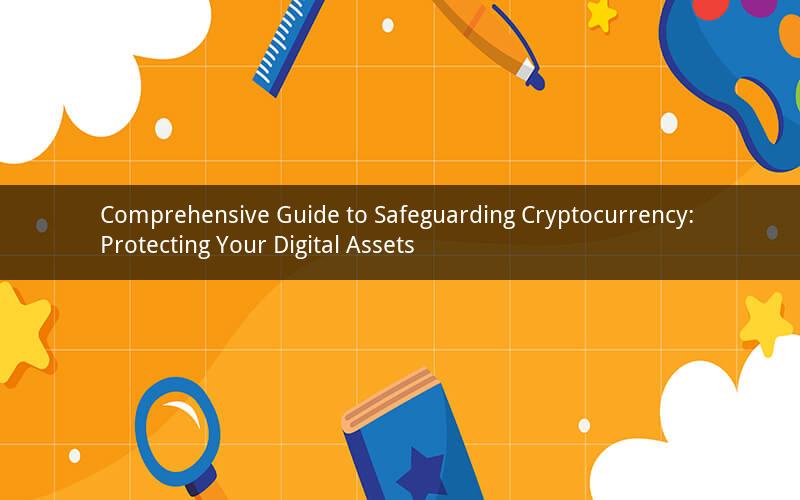
Introduction:
Cryptocurrency has become an integral part of the digital economy, attracting investors and users from all over the world. However, the inherent volatility and security concerns make it crucial to safeguard your digital assets effectively. In this guide, we will delve into various methods and practices to help you secure your cryptocurrency and minimize the risk of loss.
1. Utilize a Secure Wallet:
A secure wallet is the first line of defense in safeguarding your cryptocurrency. There are two main types of wallets: hardware wallets and software wallets.
a) Hardware Wallets: These wallets store your private keys offline, making them highly secure against online threats. Popular hardware wallets include Ledger Nano S, Trezor, and CoolWallet.
b) Software Wallets: These wallets can be accessed via a computer or mobile device. While more convenient, they are susceptible to hacking and malware attacks. It is important to choose reputable software wallets, such as Electrum, MyEtherWallet, and MetaMask.
2. Backup Your Wallets:
Regularly backup your wallets to ensure you can recover your assets in case of a hardware failure, loss, or theft. For hardware wallets, simply follow the manufacturer's instructions to create a backup. For software wallets, utilize cloud-based services like Google Drive or Dropbox to store backups securely.
3. Use Strong Passwords and Two-Factor Authentication:
Ensure your wallet accounts and related online services are protected with strong, unique passwords. Additionally, enable two-factor authentication (2FA) whenever possible. This adds an extra layer of security, requiring a second verification step to access your accounts.
4. Be Wary of Phishing Attacks:
Phishing attacks are one of the most common methods used to steal cryptocurrency. Be cautious of unsolicited emails, messages, and phone calls asking for your private keys or other sensitive information. Always verify the authenticity of any communication before sharing personal details.
5. Keep Your Software Updated:
Regularly update your operating system, wallet software, and related applications to patch vulnerabilities and protect against known threats. Outdated software can be exploited by hackers, leaving your assets at risk.
6. Utilize Multi-Sig Wallets:
Multi-signature wallets require multiple private keys to authorize transactions, adding an additional layer of security. This ensures that no single individual can access or control your cryptocurrency without the cooperation of others. Popular multi-sig wallet options include GreenAddress, BitGo, and Coinkite.
7. Consider Cold Storage:
For long-term holdings, consider using cold storage methods to keep your cryptocurrency offline. Cold storage solutions include paper wallets, hardware wallets, and secure vaults. Paper wallets are essentially printed pieces of paper containing your public and private keys. Ensure these documents are stored in a secure and fireproof location.
8. Be Mindful of Scalability and Transaction Fees:
When transferring cryptocurrency, be mindful of the network's scalability and transaction fees. High fees can attract hackers, as they may target transactions with large amounts of funds. Additionally, consider using alternative networks or layer-2 solutions to reduce fees and improve transaction speed.
9. Stay Informed and Educate Yourself:
Keep yourself updated on the latest developments in the cryptocurrency space, as new threats and security measures emerge regularly. Educate yourself on common scams, vulnerabilities, and best practices to stay one step ahead of potential attackers.
10. Consider Insurance:
If you hold a significant amount of cryptocurrency, consider purchasing insurance to protect against theft and loss. Insurance providers such as Ledger Insurance, BitGo, and Gemini offer cryptocurrency insurance policies to mitigate the risk of financial loss.
Questions and Answers:
1. Q: What is the most secure way to store my cryptocurrency?
A: The most secure way to store your cryptocurrency is to use a hardware wallet that stores your private keys offline. This reduces the risk of online threats and hacking attempts.
2. Q: Can I use the same password for my wallet and other online accounts?
A: No, it is crucial to use strong, unique passwords for each of your accounts, including your cryptocurrency wallet. This minimizes the risk of a single compromised password leading to unauthorized access to all your accounts.
3. Q: What should I do if I suspect a phishing attack?
A: If you suspect a phishing attack, do not click on any links or provide any personal information. Instead, verify the authenticity of the communication by contacting the organization directly through official channels.
4. Q: Can I use a software wallet on my mobile device for all my cryptocurrency holdings?
A: While software wallets are convenient, it is advisable to use a combination of hardware and software wallets to diversify your storage options. This minimizes the risk of losing all your assets in case of a software wallet compromise.
5. Q: How can I protect myself from scams and fraud in the cryptocurrency space?
A: To protect yourself from scams and fraud, stay informed about the latest trends and warnings in the cryptocurrency space. Be cautious of unsolicited offers, research thoroughly before investing, and always verify the credibility of individuals and organizations before engaging in transactions.